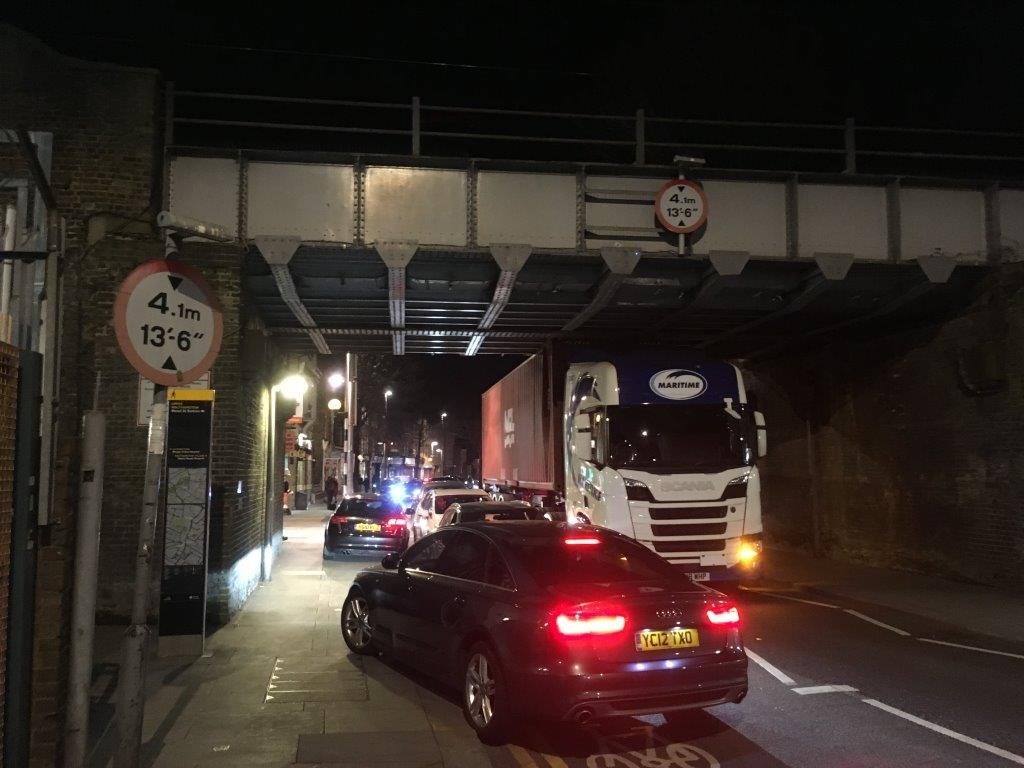Friday 1 Mar 2019
A bridge too far: Three bridge strikes in two days in East London and Norfolk
- Region & Route:
- Eastern: Anglia
- | Eastern
Network Rail Anglia is urging HGV drivers in East London and Norfolk to check the height of their vehicles and to better plan their journeys following three bridge strikes in just two days.
On 26 February, lorries struck rail bridges in Leytonstone and Walthamstow. There was a third strike on 27 February in North Walsham, Norfolk.
A lorry struck the bridge at Grove Green Road in Leytonstone at 11.15am. Train services on the Barking to Gospel Oak line were disrupted for over 30 minutes.
Later that day, a lorry struck a bridge at 7pm on Wood Street in Walthamstow. Train services between Walthamstow and Chingford were disrupted for almost an hour and a half while Network Rail examined the damage.
On 27 February, a lorry struck a bridge on Norwich Road in North Walsham, Norfolk at 10.34am, causing minor damage to the bridge and disrupting train services for over an hour.
In all three incidents, the lorries became stuck underneath the bridge but fortunately there were no injuries.
Since 1 January 2019, there have been 20 bridge strikes across the Anglia route leading to 851 minutes of delayed trains.
A Network Rail spokesperson said: “Bridge strikes are completely avoidable, they cost the taxpayer millions of pounds and delay thousands of passengers and road users every year.
“This can be avoided if drivers take the time to size up their vehicle and anything they may be towing before they set out on their journey.”
To combat bridge strikes, Network Rail recently launched 'Lorries can't limbo' - a campaign aimed at professional HGV drivers and others who drive high-sided vehicles.
To learn more about the campaign visit: https://www.networkrail.co.uk/communities/safety-in-the-community/safety-campaigns/wise-up-size-up/
Notes to Editors
A bridge strike occurs when a motor vehicle crashes into a bridge at a location where the railway passes over a road or the road crosses the railway.
Most of the vehicles that hit railway bridges are Heavy Goods Vehicles (HGVs) and buses, at a cost of around £13,000 per strike –costing the UK taxpayer around £23m in a year
Contact information
Passengers / community members
Network Rail national helpline
03457 11 41 41
Latest travel advice
Please visit National Rail Enquiries
Journalists
Martin Spencer
Martin.Spencer2@networkrail.co.uk
About Network Rail
We own, operate and develop Britain's railway infrastructure; that's 20,000 miles of track, 30,000 bridges, tunnels and viaducts and the thousands of signals, level crossings and stations. We run 20 of the UK's largest stations while all the others, over 2,500, are run by the country's train operating companies.
Usually, there are almost five million journeys made in the UK and over 600 freight trains run on the network. People depend on Britain's railway for their daily commute, to visit friends and loved ones and to get them home safe every day. Our role is to deliver a safe and reliable railway, so we carefully manage and deliver thousands of projects every year that form part of the multi-billion pound Railway Upgrade Plan, to grow and expand the nation's railway network to respond to the tremendous growth and demand the railway has experienced - a doubling of passenger journeys over the past 20 years.
Follow us on Twitter: @networkrail
Visit our online newsroom: www.networkrailmediacentre.co.uk

